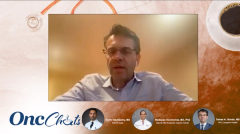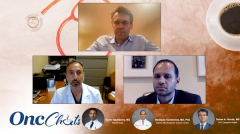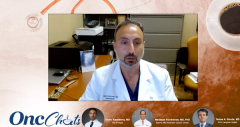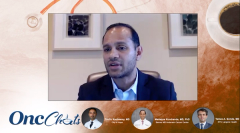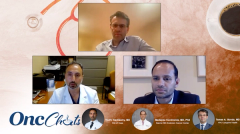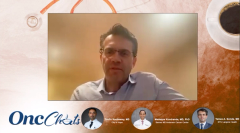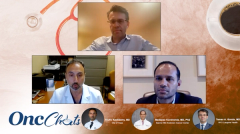
Leveraging Endoscopic Ultrasound in Pancreatic Cancer: The Promise of Radiofrequency Ablation
In this fourth episode of OncChats: Leveraging Endoscopic Ultrasound in Pancreatic Cancer, Toufic A. Kachaamy, MD, Madappa Kundranda, MD, PhD, and Tamas A. Gonda, MD, discuss what is known about the utilization of endoscopic radiofrequency ablation in nonmetastatic pancreatic adenocarcinoma and the potential for this approach in the paradigm.
Episodes in this series

In this fourth episode of OncChats: Leveraging Endoscopic Ultrasound in Pancreatic Cancer, Toufic A. Kachaamy, MD, of City of Hope, Madappa Kundranda, MD, PhD, of Banner MD Anderson Cancer Center, and Tamas A. Gonda, MD, of NYU Langone, discuss what is known about the utilization of endoscopic radiofrequency ablation (RFA) in nonmetastatic pancreatic adenocarcinoma and the potential for this approach in the paradigm.
Kachaamy:I want to shift the focus from diagnosis to [treatment]. I know that one of Dr Gonda’s areas of expertise is RFA. Dr Gonda, can you tell us about radiofrequency ablation in nonmetastatic pancreatic adenocarcinoma? Where do you use it, and what are the adverse effects [with this approach]? Currently, whether in research or in clinical use, where do you find [this approach to be] the most helpful?
Gonda: Sure, thank you. RFA is one of the thermal ablation methods that I think we have all gained significant experience [with], and appreciation for, in many other settings. Predominantly, what’s relevant here [is] ablation of liver tumors and other abdominal tumors. I think it has been one of those technologies that has been tried a little bit for pancreatic cancer, but really, for reasons that had to do to some extent with technical difficulties and with complication rates, were somewhat abandoned or fell to the wayside.
It’s over the past few years that the ability to perform endoscopic RFA, essentially using the same platform as an endoscopic ultrasound–guided biopsy, has become available. I think one of the reasons [there has been] a little bit of a shift is [this] is a significantly safer and more controlled way of performing this type of ablation in the pancreas [vs] prior methods of radiographically-guided, CT-guided biopsies, or in many cases, surgically-guided RFAs. As Dr Kundranda mentioned, when you start putting even diagnostic needles into the pancreas, there’s a substantial rate of pancreatitis, which is one of the complications that was very clearly seen with some of the prior ways of doing RFA. So, I think as it emerged first and foremost for the treatment of neuroendocrine tumors in the pancreas, it has demonstrated a very reasonable and acceptable safety profile with a quite low [rate of] pancreatitis and other complications.
I think recognizing that pancreatic cancer is a much harder disease to treat than neuroendocrine tumors; it is often thought of as a systemic disease, which is probably the right way to think about it. Nonetheless, the appeal of providing local control using a quite safe ablative technology that is essentially delivered and done just like an EUS-guided biopsy, which is a 45-minute to 1-hour-and-a-half long outpatient procedure, has significant appeals. For pancreatic adenocarcinoma, I think it’s important to mention that [this] is definitely in the early stages, and we’re just starting to collect data on efficacy and [understanding] what this modality changes or [how it] fits into the treatment paradigm of pancreatic cancers.
One of the areas that I think is particularly interesting and is not unique to this technology but may lead to finding a place in the treatment of pancreatic cancer for RFA, is the idea that this thermal ablation and local destruction kind of results in an awakened immune response. This may sensitize these pancreatic cancers, which are generally thought to be nonresponsive to immune therapy, to potentially increase the effectiveness of immune therapy. This [hypothesis] is mostly [in] the preclinical stage. Some nice studies have shown efficacy [with] this kind of ablation in preclinical models, [with regard to] sensitizing tumors to immunotherapy. I think that’s one area that may potentially be very exciting.
The other is, of course, enhancing or increasing the ability for local control and potentially thinking of this as either an adjunct or an alternative to other local or targeted therapies like radiation therapy to increase the ability of these tumors to move from being a locally advanced lesion with significant vascular invasion to achieving better local control and allowing the patients to have a potentially curative resection in combination with chemotherapy. Again, it’s early days, but there are some data [to suggest] that the use of RFA may help convert or increase the chance of R0, or margin-negative resections, in pancreatic cancer.
Check back on Tuesday for the next episode in this series.


